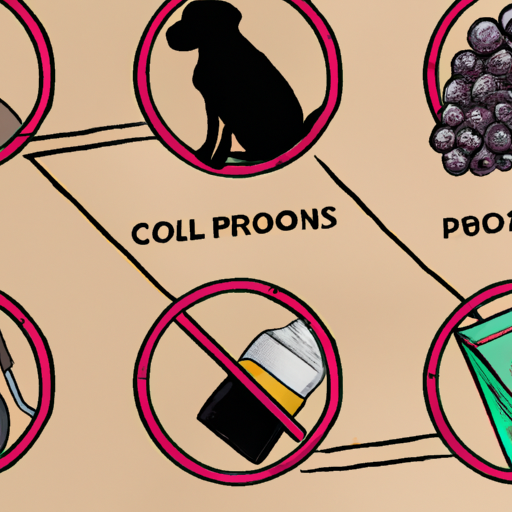As a loving and responsible pet owner, you want to ensure your dog’s safety at all times. It’s crucial to be aware of the various substances that can harm your furry friend. This guide aims to educate you on what poisons dogs, so you can protect your pet from potential dangers lurking in your home and outdoors.
1. Foods That Are Poisonous to Dogs
Not all foods that are safe for you are safe for your dog. Here are some common foods that can be toxic to your dog:
- Chocolate and Caffeine: These contain methylxanthines, which can cause vomiting, diarrhea, panting, excessive thirst, abnormal heart rhythm, seizures, and even death. The darker the chocolate, the more dangerous it is.
- Grapes and Raisins: Even a small amount can cause kidney failure in dogs.
- Alcohol: This can cause vomiting, diarrhea, difficulty breathing, tremors, decreased coordination, abnormal blood acidity, coma, and even death.
- Onions and Garlic: These can damage a dog’s red blood cells, causing anemia.
2. Household Items That Are Poisonous to Dogs
Your house is full of potential hazards for your dog. Here are some items to watch out for:
- Cleaning Products: These can cause gastrointestinal upset, chemical burns, or respiratory distress.
- Rodenticides: Ingesting rat poison can cause bleeding, seizures, and kidney damage in dogs.
- Antifreeze: It’s sweet taste can be appealing to dogs, but it is extremely poisonous and can quickly lead to kidney failure.
3. Plants That Are Poisonous to Dogs
Some plants can be harmful or even deadly to dogs. Keep these out of your dog’s reach:
| Plant | Symptoms |
|---|---|
| Azalea | Vomiting, diarrhea, weakness, cardiac failure |
| Tulip | Oral irritation, drooling, nausea, vomiting, diarrhea |
| Sago Palm | Vomiting, melena, jaundice, increased thirst, hemorrhagic gastroenteritis, bruising, coagulopathy, liver damage, liver failure |
4. Medicine Toxicity in Dogs
Even medicine designed to help can harm your dog if it’s not prescribed by your vet. Never give your dog medication without consulting a vet first. Painkillers, cold medicines, anti-cancer drugs, antidepressants, vitamins, and diet pills can all be toxic to dogs.
5. Toxins in the Environment
While walking or playing outside, your dog can encounter various toxins. Watch out for:
- Fertilizers and Pesticides: These can cause a range of symptoms from mild nausea to severe neurological problems.
- Blue-Green Algae: Found in stagnant water during hot weather, it can cause liver damage or failure.
- Toxic Frogs: Some species secrete a toxin that can be lethal to dogs.
Frequently Asked Questions (FAQs)
Q: What should I do if my dog ingests poison?
A: Immediately contact your vet or the Pet Poison Helpline at 855-764-7661. Do not induce vomiting unless instructed to do so.
Q: How can I prevent my dog from being poisoned?
A: Keep your home and yard free from toxic substances, and monitor what your dog eats and drinks. Always consult your vet before giving your dog any new food or medication.
Q: Can a dog recover from poisoning?
A: It largely depends on the type and amount of poison ingested, as well as how quickly treatment is started. Some dogs can fully recover with prompt and appropriate treatment.
Remember, knowledge is the first line of defense in preventing dog poisoning. By keeping these toxins out of your dog’s reach and promptly seeking veterinary care if your dog is exposed, you can help ensure your furry friend’s health and safety.



